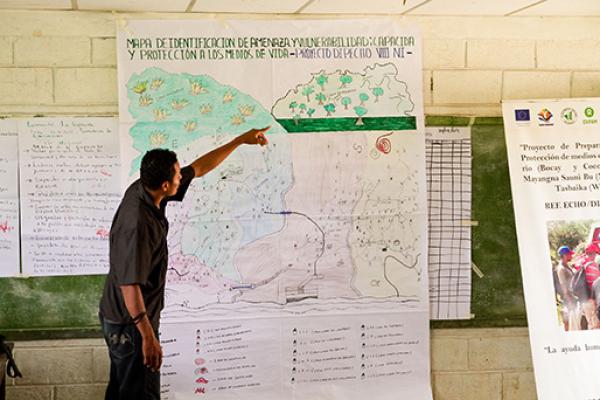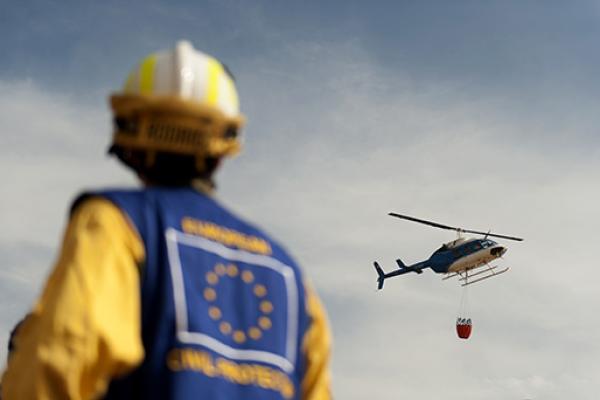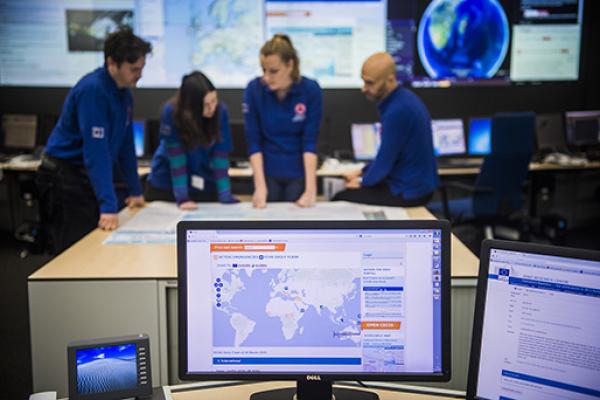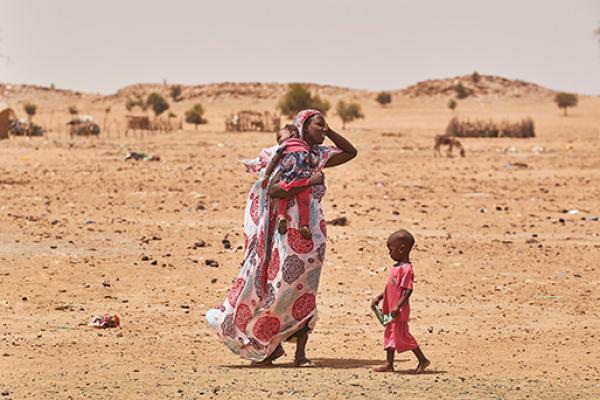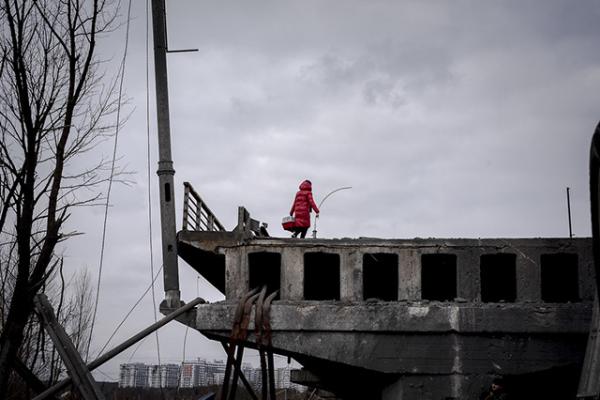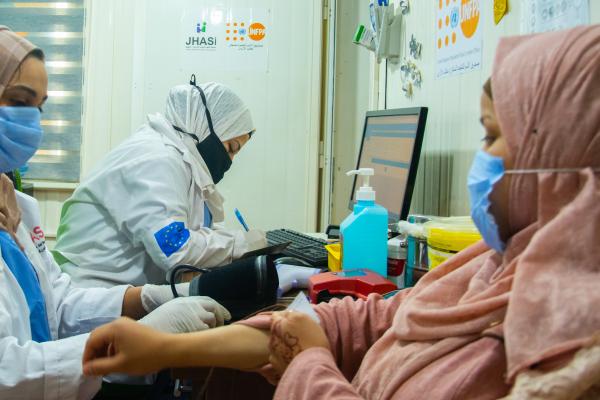Have you ever wondered what happens when disaster strikes, or a humanitarian crisis arises? EU Civil Protection and Humanitarian Aid experts and partners are there to deliver life-saving aid.
Listen to tales from experts working behind the scenes. We’ve partnered up with podcasts across Europe – in Ireland, the Netherlands, Portugal, Spain, and Poland – to bring you the stories behind the headlines.
Hear podcast hosts and their special guests in conversation about medical evacuations from Ukraine, the EU’s response to climate change-induced disasters, such as floods and wildfires, humanitarian health assistance and disaster preparedness.
Our experts will discuss their work on the frontline of emergency and humanitarian response, sharing their personal stories and insights into what it takes to deliver assistance, when failing is not an option.
Through their stories, take a look behind the scenes to discover the challenges they face in their life-saving work, and find out more about the EU’s response to complex crises.
Listen to the #EUSolidarityTalks below.
Disaster preparedness at the heart of EU humanitarian aid activities
Before a hurricane ravages coastal areas, before a river overflows, or before an earthquake hits, the EU is helping the communities at risk prepare for the worst.
These natural hazards and other human-made disasters affect millions worldwide each year. The danger is further amplified by population growth, urbanisation, poverty, and climate change. Being prepared is crucial. It saves lives, protects livelihoods, and reduces humanitarian needs.
With the help of its Disaster Preparedness Guidance Note, the EU aims to mainstream multi-hazard preparedness and risk reduction measures across all its humanitarian programmes. These include actions such as:
- better forecast ahead of monsoon for communities in Bangladesh,
- a drone and satellite programme collecting data and assessing the needs of Mozambique communities in the event of a natural hazard,
and many more.
Featured podcast: The Explainer
The Explainer is a weekly podcast from Irish newspaper The Journal. They speak to Davide Zappa, an EU humanitarian aid expert on disaster risk reduction and Sanchita Neupane, from People in Need, Nepal, 1 of the EU’s humanitarian partners, about the EU’s role in risk reduction in Nepal and the Philippines.
45 Graus
In this episode of the award-winning Portuguese podcast 45 Graus, host José Maria Pimentel delves into disaster preparedness and risk reduction in Latin America and the Caribbean with Álvaro De Vicente. Álvaro oversees our Regional Office in Panama. His humanitarian background includes positions in South America, East Asia, and with Action Contre la Faim in Paris. In this episode, he shares his expertise, offering a comprehensive view of the EU’s disaster preparedness efforts in the region.
Revista 5W
Every week Spanish magazine Revista 5W publishes a deep-dive podcast episode. In this edition, they speak with Andrés Triviño about how the EU has helped to build resilience and preparedness with indigenous and rural communities in the Amazon. Andrés has over 15 years of experience as a humanitarian aid worker, mostly working on migration, forced displaced communities, armed conflicts, and disaster preparedness. He now works from our Regional Office in Panama, overseeing similar EU funded actions in South America and the Caribbean.
EU response to health emergencies
Around the world, people are affected by health crises. 50% of the world lack access to healthcare, according to the World Health Organization (WHO), and over 70% of epidemics occur in fragile, conflict-affected, and vulnerable settings.
The EU and its international partners play a crucial role in responding to healthcare crises and emergencies across the globe.
Discover how humanitarian health support from the EU is helping vulnerable populations recover from health crises.
Featured podcast: The Explainer
The Explainer is a weekly podcast from Irish newspaper The Journal. For this episode, the Explainer spoke to Jean-Paul Jemmy Ghomsi, an EU humanitarian aid expert for health and a doctor, specialised in nutrition.
They talk/are talking about his experience in supporting healthcare in conflict-affected areas and the impact of malnutrition on children’s health.
Revista 5W
Spanish magazine Revista 5W publishes podcast episodes to help their listeners have a better understanding of the news story of the week. In this episode, they interview Álvaro De Vicente.
Álvaro oversees the EU humanitarian response in Latin America and the Caribbean. They talk about the impact of exponential violence and criminality on health and access to humanitarian health assistance.
45 Graus
José Maria Pimentel presents 45 Graus, an award-winning podcast in Portuguese. The episode features Ian Van Engelgem, a humanitarian health and nutrition expert at the EU’s Department for Civil Protection and Humanitarian Aid Operations.
They talk about the challenges of response to health crises and the EU’s humanitarian health assistance in Africa.
EU response to climate change-related emergencies
Extreme floods in Belgium, Germany, Slovenia and Italy. Record breaking wildfires in Greece. Heatwaves throughout the continent. The frequency and severity of climate change-induced disasters are on the rise across Europe – and are likely to continue to increase as climate change grips the world.
The European Commission's Department for Civil Protection and Humanitarian Aid Operations staff has been coordinating assistance in response to natural hazards or human-induced disasters.
Discover how their work is helping countries affected by climate change-induced emergencies, and the specific measures implemented through the EU Civil Protection Mechanism and rescEU, to better prepare for and respond to these situations.
The Explainer
The Explainer is a weekly podcast from Irish newspaper The Journal. For this episode, the Explainer spoke to guests Esther El Haddad and Johanne La.
Esther, an analyst at Directorate-General for European Civil Protection and Humanitarian Aid Operations, works on Early Warning Systems and Environmental emergencies, ensuring that operations are running 24/7.
Johanne is Deputy Team Leader at the Emergency Response Coordination Centre (ERCC). She recently coordinated assistance in response to fire and flood emergencies across Europe and Africa.
45 Graus
José Maria Pimentel presents 45 Graus, an award-winning podcast in Portuguese. The episode features João Silva, Policy Officer at EU Civil Protection, who works on the rescEU assets for the Civil Protection Emergency Response Capabilities.
He discusses the impact of climate change, as well as the EU’s response to climate change-induced disasters and approach to risk assessments and disaster risk reduction.
Journalist, influencer and award-winner Maciej Orłoś presents his podcast in Polish. In this episode, he interviews Marcin Pater, Operations Deputy Team Leader at the Emergency Response Coordination Centre (ERCC).
Marcin served for 16 years as a fire officer and has been the Deputy Team Leader in the Emergency Response Coordination Centre since 2019. He shares his insights on wildfire preparedness activities as well as missions in response to floods and wildfires in which he has taken part.
EU Medical evacuations from Ukraine
It’s been over 2 years since war broke out in Ukraine and people in the country are facing increasingly dire conditions.
Hospitals have been damaged and there’s a shortage of medical teams and supplies.
What happens to the critically ill and injured patients in Ukraine? The EU has been evacuating those in need of life-saving care to the EU Medevac Hub in Poland and then transferring them to hospitals across Europe.
The Explainer
The Explainer is a weekly podcast from Irish newspaper The Journal that takes a deeper look at the news. It’s known for offering balanced, factual information on important topics and diving deeper into key issues.
The Explainer spoke to Eric Adrien, Duty Officer at the European Emergency Coordination Centre, about his role in setting up the medical evacuation operations, which saw him deployed to Poland to work on site.
In Polish, Maciej Orłoś PODCAST speaks to Karolina Moycho, who was a key part of the team that set up the EU Medevac Hub in Poland, and Adam Szyszka, the Hub’s Team Leader and coordinator.
Betrouwbare Bronnen
In Dutch, Betrouwbare Bronnen podcast discusses the Medevac operations and Hub in Rzeszów, Poland with Sien Vanlommel, Duty Officer at the Emergency Response Coordination Centre, who helped with the Hub’s setup and operations.


